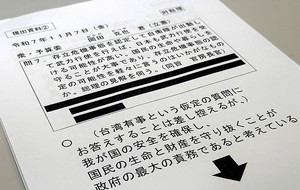By AKIFUMI NAGAHASHI/ Staff Writer
January 16, 2025 at 16:19 JST
 The price board at Nishi-Ayase SS, a gas station in Tokyo’s Adachi Ward, reflects the rising cost of gasoline on Jan. 15. (Akifumi Nagahashi)
The price board at Nishi-Ayase SS, a gas station in Tokyo’s Adachi Ward, reflects the rising cost of gasoline on Jan. 15. (Akifumi Nagahashi)
Gasoline prices are set to rise once more as the government further reduces subsidies.
According to the Oil Information Center, the average price nationwide for a liter of regular gasoline reached 180.7 yen ($1.16) on Jan. 14, marking a 5-yen increase from a month ago.
With the government gradually phasing out subsidies, prices are expected to climb another 5 yen starting from Jan. 16.
Gas stations across the country reported a surge in customers as people rushed to fill their tanks before the price hike.
“I’ll have to cut back on other costs to cover the increase,” said one last-minute customer at Nishi-Ayase SS in Tokyo’s Adachi Ward.
The 29-year-old interior contractor said the price hike would hit him hard, as the car is essential for his work.
The gas station manager also expressed concerns that higher prices would lead to a drop in sales.
At another gas station in Sapporo, the line of cars waiting spilled out onto the road.
The government decided in November to continue its gasoline subsidy program but with reduced support.
Previously, the government had capped prices at around 175 yen per liter, but this ceiling is being gradually raised, reaching 185 yen from Jan. 16.
The subsidy program was introduced in January 2022 as part of a broader initiative to combat rising fuel prices. So far, more than 6 trillion yen has been spent from the 8.17-trillion-yen budget set aside for the initiative.
Despite public support for the subsidy, some experts warn that the policy is not sustainable.
“It puts a significant burden on the government’s finances and undermines decarbonization efforts,” said Takahide Kiuchi, an executive economist at Nomura Research Institute Ltd.
“Other countries have already abandoned such measures, but Japan maintains them due to public pressure,” he added.
Last month, the ruling Liberal Democratic Party and its coalition partner, Komeito, reached an agreement with the Democratic Party for the People to reduce the gasoline tax by 25.1 yen per liter.
“While this aims to offset the subsidy cuts, it will result in a decline in tax revenue, and the government will need to find alternative funding sources,” Kiuchi said.




















A peek through the music industry’s curtain at the producers who harnessed social media to help their idols go global.
A series based on diplomatic documents declassified by Japan’s Foreign Ministry
Here is a collection of first-hand accounts by “hibakusha” atomic bomb survivors.
Cooking experts, chefs and others involved in the field of food introduce their special recipes intertwined with their paths in life.
A series about Japanese-Americans and their memories of World War II